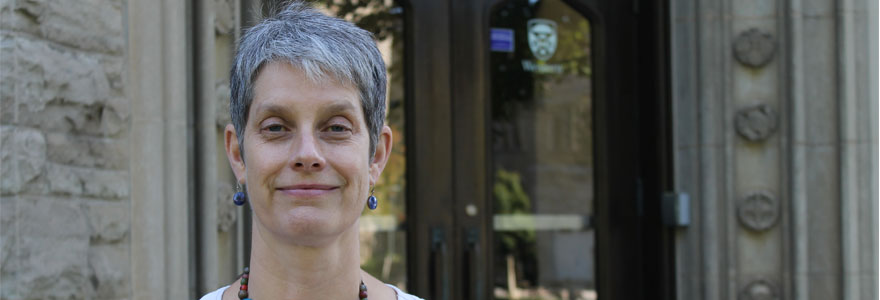News and Updates
Contact
Faculty of Social Science
Social Science Centre
Room 9438
Western University
T. 519-661-2053
F. 519-661-3868
E. social-science@uwo.ca
Understanding how to improve accessibility in university
January 16, 2023
Photo and story by Rob Rombouts
In her role as Assistant Dean (Equity, Diversity, Inclusion & Decolonization) for the Faculty of Social Science, Kim Clark was struck by “how quickly disability disappears from the discussion of EDI.”
With this observation in mind, and with expectation of an increase in students and staff with disabilities following the COVID-19 pandemic, Clark felt the time was right to get a better understanding of the experiences of students with disabilities inside and outside the classroom at Western.
Working with Andrew Walsh, professor in Anthropology, and students recruited through the Western Undergraduate Summer Research Internships program (USRI) – Kate Mahoney, Sam Schneider, Anika Sebudde – the research team surveyed students who self-identified as having a disability, about both their experiences in class and accessing services across the university.
The survey included many open-ended questions, so as to not pre-judge or limit responses about what makes classes or campus in general accessible or inaccessible for students with a range of disabilities.
Clark said including student researchers in the research project was incredibly important. “Everyone on the team is within one-degree of separation of disability experience.”
The research survey was co-designed with the students, to reflect the issues that they thought would be most relevant to students. The student researchers were also able to provide important context about the lived experience. Surveys were followed by interviews with a smaller number of respondents, conducted by the USRI students.
Having the USRI students carry out the interviews provided opportunities for them to gain experience with different research methods but these peer-to-peer conversations also “changed the dynamic. The (USRI) students were interviewing but at moments were also sharing their experiences.”
Accessibility in research opportunities
Clark considered many different aspects of accessibility when starting the project. Selecting students from the ‘unmatched stream’ of USRI piloted by Social Science provided research opportunities for students who might not have already established relationships with faculty members. Students were able to apply even if they had not already identified a specific project or faculty mentor to supervise them, and departments worked hard to match these individuals to faculty members interested in supervising them.
“Western created the USRI to give undergraduate scholars the opportunity for hands-on research experience early in their career. One risk of this kind of program is that it might be biased toward students who were able to form relationships with their professors early in their degree,” said Marc Joanisse, Associate Dean (Research) for Social Science. “Some individuals can find themselves shut out of these experiences because they entered the program later on, whose circumstances haven’t allowed them to accumulate volunteer hours in laboratories, or simply were never told that such things were possible. We have worked hard to overcome this structural impediment that we feel was disproportionally leaving out students from under-represented groups.”
“We wanted to provide research experience for people who may not have that opportunity,” she said. “All three of the students on our team have applied, or are applying, for graduate programs, so it really did give them the experience or confidence to know they enjoyed research.”
Joanisse said that “as a result, the number of applicants increased 50%. We were encouraged that over a third of the students who won USRI positions had applied through this alternative ‘unmatched’ stream.”
Better building accessibility
Drawing on the responses, the research team published summaries of their research in The Conversation and on the Canadian Anthropology Society blog. Members of the research team also presented as a part of a workshop on Inclusive Pedagogy for the Centre for Teaching and Learning, and Clark is scheduled to discuss this research as part of a keynote panel during the University of Calgary’s EDI week.
Among the results, Clark points to the ‘access fatigue’ experienced by many students with disabilities who feel they have to constantly advocate or negotiate for themselves – with the institution, instructors and classmates – even if they are registered for accessibility supports. Inaccessible practices in teaching and services means disabled students “are working harder to get access to education than other students,” said Clark.
Practices that increase access for people with disabilities can also help other students. For instance, when people who are creating information, be it instructors or staff, consider what headings to embed for accessibility, this can help focus and clarify their writing.
“Using accessibility features in documents can help us understand and reflect on what and how we are trying to communicate,” said Clark.
In the end, Clark hopes to see real change undertaken by her colleagues and from institutions.
“Students with disabilities responded to our survey and interviews in a forthcoming way with lots of information. We treated students with disabilities as experts on what they need,” said Clark. “I feel responsibility to share what students told us, because that’s why they took the time to tell us what really matters to them.”

